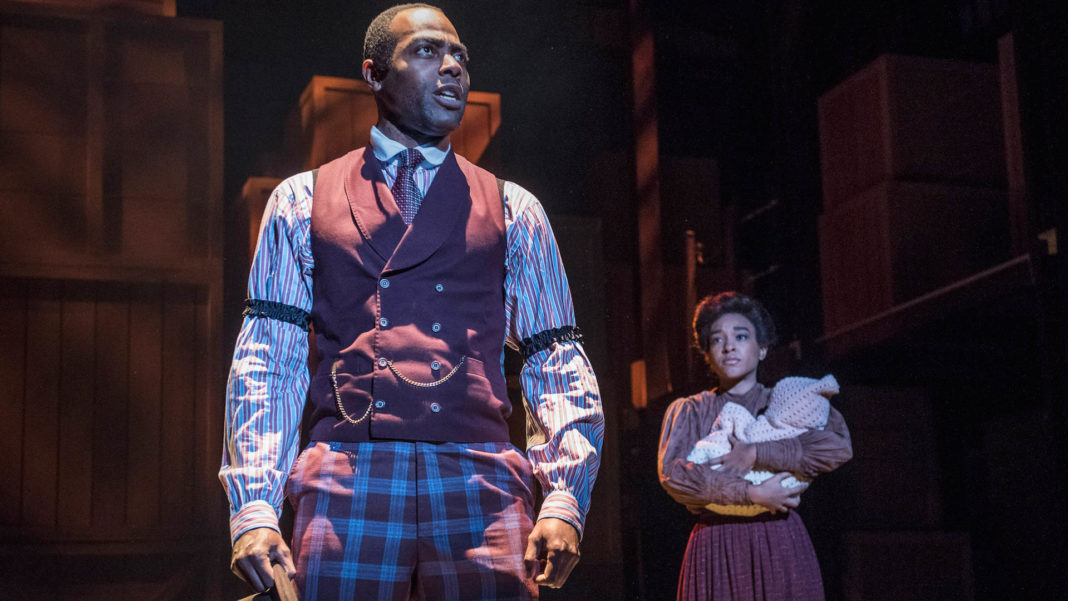When actor Clifton Duncan was an undergrad he thought a lot of musicals were like The Lion King and Beauty and the Beast. “I took a class from a grad student named Mark Hardy who was teaching Singing for Actors.” It was in this class that he got his first introduction to the musical Ragtime. “One of my assignments was Wheels of a Dream. That class was my awakening to musical theatre in general. It’s not just Disney musicals, there’s epic stuff here.”

That was almost twenty years ago. Flash forward to present day as Duncan now finds himself playing the role of Coalhouse Walker in the Pasadena Playhouse production of Ragtime. The show, directed by David Lee, has its official opening on Sunday and will run through March 9th.
Ragtime was written by composer Stephen Flaherty, lyricist Lynn Ahrens and book writer Terrence McNally and is based on E.L. Doctorow’s acclaimed novel. Ragtime weaves together multiple stories at turn-of-the-century America and includes both historical figures (Harry Houdini, Henry Ford, Emma Goldman) and fictional ones. The fictional Coalhouse Walker is the heart of the musical.
“Doctorow was inspired by this German novella, Michael Kohlhaas [written by Henrich Von Kleist in 1811],” says Duncan in a conversation on a day off from rehearsals. “Doctorow did a really genius adaptation of that plot. What’s great is in addition to the bureaucratic frustrations and barriers he faces, there’s the added level of the racial discrimination which works really well for the story. He’s this unstoppable, persistent and tenacious juggernaut and you get the sense he’s mysterious and someone who created himself.”
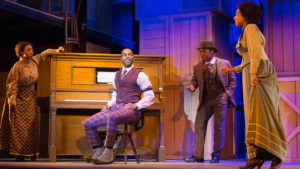
In both the novel and the musical, Walker is a Harlem pianist introducing ragtime music to the public. He finds that in spite of his race, this music brings people together. The song New Music showcases the impact this new sound has on people of all races.
“Coalhouse’s music fills the house and transforms everybody,” Duncan says of one of his favorite sequences. “I think when you consider it was the hip-hop music of its generation. It was new and radical and dangerous. Coalhouse, being a black man in this well-to-do neighborhood and family and to be able to have that effect with this new and dangerous form of music, it just shows that no matter what culture you come from, there’s something about art and music and love, to sound corny and clichéd, that transcends all barriers.”
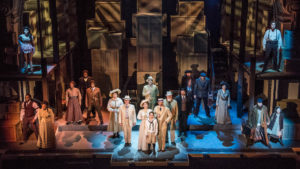
Over the course of Ragtime, Walker falls in love, finds himself fighting very serous battles and making some decisions that aren’t truly in his best interest. It is some of those choices that have given Duncan challenges as an actor.
“He’s such an intelligent guy. The biggest challenge is the naiveté actually. Some of the plot points are difficult to negotiate. What’s great is you have these great songs you can pour your emotions into and you have these tight book scenes you can bring to life. Even though it’s a tragic figure, it’s actually a lot of fun.”
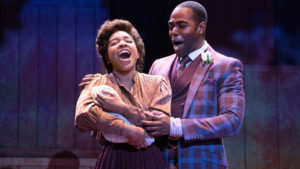
Coalhouse meets a woman named Sarah (Bryce Charles) and becomes infatuated with her. He shows up every day calling on her in the musical until she finally agrees to talk to him.
“If you go digging into ragtime and ragtime pianists,” Duncan says, “they were hired to play in bordellos. He paid for his piano lessons and education by working. My idea is he becomes haunted by Sarah because she’s so different. They speak the same musical language and she gets him in a way no other woman has. And she is the reason he’s inspired to be a better man.”
Last year Duncan starred with Anika Noni Rose in a revival of the rarely-produced musical Carmen Jones – an adaption of Bizet’s Carmen with lyrics by Oscar Hammerstein II. In a New York Times story, Duncan said that musical possessed a “crudity” that was a product of the times. I wondered if either Doctorow’s novel, which is 44 years old, or the musical, which is 23, had similar problems for the actor.
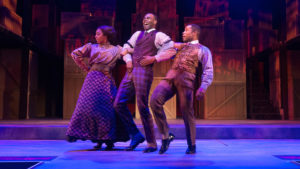
“I can’t think of anything I would find crude about Coalhouse. He’s educated and self-made. It goes back to the ability of art to transcend. I tell young people that if you read old plays and old novels, cultures change, but what drives us fundamentally is the same stuff: we want to fall in love, we get angry and jealous. I tend, for myself, to focus less on race these days and more on culture. Ragtime is about different cultures and what we do. The attention to detail and sensitivity to those cultural differences helps bolster one of the central constructs of the play: America is a multi-cultural society and what does it mean to be an American.”
If Ragtime allows us to understand the similarities we share with one another, what does Duncan hope people will understand about him through the characters he plays?
“Wow, that’s a deep question. One of the things I pride myself on is being a character actor who sings. I have no illusions about my level of importance, but at the same time I totally embrace my role as an entertainer to give them something they haven’t seen before. As far as the men that I play, I had a friend who once said, ‘actors don’t choose roles, the roles choose them.’ My approach is always about how can I make this person human and relatable. When I was doing Ruined I was in my own little funk. One of my mentors said to go to a museum. I saw these sculptures from hundreds and hundreds of years ago. I was brought to tears because of the amount of vision and craft and artistry that went into creating these sculptures. The skin looks like skin. The clothes look like clothes. This is a connection to humanity and what we’ve been going through since human history began. That’s what it’s about to me. We’re all in this together.”
Update: This post has been updated to revise the closing date to March 9th as the Pasadena Playhouse has extended the run of “Ragtime”
All photos courtesy of the Pasadena Playhouse












